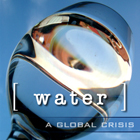
|
||||||||||||||||||||||||||||||||
|
SHIJIAZHUANG, CITY OF 2 MILLION, FAST RUNNING OUT OF WATER, HAS LITTLE PLANNING TO FACE IMMINENT CHRONIC DROUGHT 28 September 2007 Shijiazhuang, a city of 2 million on the North China Plain saw 11% growth last year, is undergoing a population and construction boom, and is inviting new residents with money to spend to inhabit water-intensive luxury housing, even as irreplaceable aquifers are drying up, and water tables are dropping at alarming speed. Fossil aquifers upon which the region is already over-dependent may be dry by 2037. [Full Story] WATER RESOURCE STRESS: GLOBAL ECONOMIC-ECOLOGICAL FACTOR FOR THE 21ST CENTURY Water is one of the "fundamental building-blocks of life", as is often said in science, in biology classrooms, in medicine, theology, environmental policy debates, and in cosmology and space exploration. It is also a commodity whose economic reality is increasingly defined by chronic scarcity and often intensely uneven distribution. [Full Story] MONSOONS HAVE CAUSED CATASTROPHIC FLOODS IN BANGLADESH, NEPAL, EASTERN INDIA Bangladesh is one of the world's most low-lying countries, with nearly half its area below sea level. At the end of the Himalayan watershed, it is prone to floods of sometimes incomprehensible proportions. This year's monsoons have taken at least 75 lives in one week, with 29 killed across eastern India and Bangladesh on Monday alone. [Full Story] DEVELOPERS SUCCESSFULLY LOBBY TO SOFTEN WETLANDS CONSERVATION RULES In June 2006, the Supreme Court issued a ruling requiring that previously unprotected small or unmapped streams and waterways be brought under the 1972 Federal Clean Water Act. Isolated wetlands were to fall under this ruling, and the US government drafted a policy proposal that would regulate the development or filling of such wetlands. Now, new language added to the rules, seem to leave isolated wetlands without federal oversight. [Full Story] DANUBE ADDED TO LIST OF MAJOR RIVERS IN DANGER OF DISAPPEARING How can a major river disappear? It is all too easy to thing this will never happen, that nature is in balance and will always find a way. But the reality is that nature replaced no-longer viable realities with others that can stand up to circumstance, and circumstance is stressing some major rivers beyond their capacity. The Danube is the latest to be added to a list of endangered rivers. [Full Story] DISTILLERY DEMAND FOR GRAIN TO FUEL CARS VASTLY UNDERSTATED Investment in fuel ethanol distilleries has soared since the late-2005 oil price hikes, but data collection in this fast-changing sector has fallen behind. Because of inadequate data collection on the number of new plants under construction, the quantity of grain that will be needed for fuel ethanol distilleries has been vastly understated. Farmers, feeders, food processors, ethanol investors, and grain-importing countries are basing decisions on incomplete data. [Full Story] FEDERAL JUDGE STRIKES DOWN BUSH POLICY LOOSENING CONTROLS ON PESTICIDE USE U.S. District Judge John C. Coughenour has struck down a Bush administration policy loosening regulation of toxic pesticides. He found the rule change "striking in its total lack of any evidence of technical or scientific support for the policy positions ultimately adopted" and further chastised the government for failing to properly apply the Endangered Species Act. [Full Story] INVESTIGATIONS INTO BP'S OPERATIONS IN ALASKA WIDEN Global petroleum giant BP has been forced to shut down the entire supply from its Prudhoe Bay pipeline, due to corrosion that has caused several spills and threatens an environmental catastrophe. Now, US investigators are demanding sections of the pipeline be dismantled and sent as evidence to a criminal inquiry. [Full Story] WORLD’S WATER RESOURCES FACE MOUNTING PRESSURE Global freshwater use tripled during the second half of the twentieth century as population more than doubled and as technological advances let farmers and other water users pump groundwater from greater depths and harness river water with more and larger dams. As global demand soars, pressures on the world’s water resources are straining aquatic systems worldwide. Rivers are running dry, lakes are disappearing, and water tables are dropping. [Full Story] WORLD WATER DAY HIGHLIGHTS EFFECTS OF POVERTY, CLEAN WATER SCARCITY ON 1 BILLION WORLDWIDE Parts of east Africa have not seen rain for six years and six nations there are facing extreme famine. Through events organized by UNESCO, the UN and NGOs are hosting World Water Day today, to raise awareness of the problem of scarcity of safe drinking water affecting an estimated 1 billion people worldwide. [Full Story] SNOWS OF KILIMANJARO DISAPPEARING AT ACCELERATED RATE Research and new images show glaciers famed as "snows of Kilimanjaro" receding at alarming rate, far faster than projections had suggested. Researchers at Ohio State University, who warned five years ago that the famed snowcap on Mount Kilimanjaro might melt or even disappear now say the melt is occurring, but at a rate much faster than expected. [Full Story] BOTTLED WATER: POURING RESOURCES DOWN THE DRAIN The global consumption of bottled water reached 154 billion liters (41 billion gallons) in 2004, up 57 percent from the 98 billion liters consumed five years earlier. Even in areas where tap water is safe to drink, demand for bottled water is increasing—producing unnecessary garbage and consuming vast quantities of energy. Although in the industrial world bottled water is often no healthier than tap water, it can cost up to 10,000 times more. At as much as $2.50 per liter ($10 per gallon), bottled water costs more than gasoline. [Full Story] ARCTIC ICE MELT WILL SOON OPEN NORTH-POLE SHIPPING As ice melts across the arctic north, and the Arctic Ocean opens up in summer months, the mythic Northwest Passage is expected to open to regular shipping, and Russia's Northern Sea Route is expected to rival it in global trade traffic, within a generation. It is also expected the Arctic Ocean will be completely without ice in warm months by the end of the 21st century. [Full Story] PERMAFROST MELT IMPERILS INFRASTRUCTURE, HOMES A new study by American researchers, published today in Geophysical Research Letters, suggests the top layers of arctic permafrost could be melted by the end of this century. Researchers believe the melt would release large amounts of contained carbon into the atmosphere, contributing to an accelerating cycle of warming and interrupting deep ocean currents that help regulate the planet's climate. [Full Story] CARTERET ATOLLS OFFICIALLY TO EVACUATE PLANET'S FIRST CLIMATE CHANGE REFUGEES On 26 November, the Guardian newspaper first reported that inhabitants of the Carteret atolls, six islands which form part of Papua New Guinea, in the southwest Pacific, have been subject to the first officially mandated permanent climate change evacuations. Rising sea levels have placed the circular grouping of six islands in serious danger of permanent inundation, and have left the soil useless for harvesting traditional foods. [Full Story] CHINESE CITY STRUGGLES WITHOUT WATER, AMID CHEMICAL CONTAMINATION The Chinese city of Harbin and environs, located in Heilongjiang province, and home to an estimated 3.8 million people, is beset with a severe water crisis. Panic buying followed hoarding of municipal water, after authorities announced they would shut off the entire municipal water system, to spend four days testing and cleaning water reportedly contaminated by runoff from a chemical plant explosion. [Full Story] AFRICA SUFFERS SPREAD OF FAMINE, HUNGER As the world begins to focus on the nearly 3 million facing hunger in Niger and the catastrophic refugee crisis in Darfur, in western Sudan, an estimated 31.1 million people across the continent face food shortages. Arable land, foodstocks and agriculture in general are suffering dangerous setbacks, making it increasingly difficult to feed African populations, some of which are growing rapidly. [Full Story] WORLD'S FRESH WATER RAPIDLY BEING DEPLETED, GLOBAL SHORTAGE FEARED The United Nations has been pushing for some time for a global strategy to deal with the looming scarcity of fresh water. A BBC report from June 2000 indicated 1 in 5 of all living human beings already lacks access to safe drinking water. Dramatically making the point that our oceans cannot solve the problem, the report says "Only 2.5% of the world's water is not salty, and two-thirds of that is locked up in the icecaps and glaciers." [Full Story] DEAD ZONES INCREASING IN WORLD'S COASTAL WATERS As summer comes to the Gulf of Mexico, it brings with it each year a giant “dead zone” devoid of fish and other aquatic life. Expanding over the past several decades, this area now can span up to 21,000 square kilometers, which is larger than the state of New Jersey. A similar situation is found on a smaller scale in the Chesapeake Bay, where since the 1970s a large lifeless zone has become a yearly phenomenon, sometimes shrouding 40 percent of the bay. [Full Story] JORDAN URGES ACTION TO SAVE DEAD SEA The government of Jordan has issued a plea to the international community to organize an effort to save the Dead Sea from extinction. As experts predict the world's saltiest sea and the point of its lowest altitude will disappear within 50 years if action is not taken, the Jordanian government has requested international action to plan for feeding water into the sea, to save it. Irrigation systems in neighboring Syria and Israel have contributed to the Dead Sea's losing 1 meter of depth per year for 20 years. [Full Story] WORLD CREATING FOOD BUBBLE ECONOMY BASED ON UNSUSTAINABLE USE OF WATER As world water demand has tripled over the last half-century, it has exceeded the sustainable yield of aquifers in scores of countries, leading to falling water tables. In effect, governments are satisfying the growing demand for food by overpumping groundwater, a measure that virtually assures a drop in food production when the aquifer is depleted. Knowingly or not, governments are creating a "food bubble" economy. As water use climbs, the world is incurring a vast water deficit... [Full Story] POPULATION GROWTH SENTENCING MILLIONS TO HYDROLOGICAL POVERTY We live in a water-challenged world, one that is becoming more so each year as 80 million additional people stake their claims to the Earth’s water resources. Unfortunately, nearly all the projected 3 billion people to be added over the next half century will be born in countries that are already experiencing water shortages. [Full Story]
More at Sentido's Environment & Ecology archives...
|
|||||||||||||||||||||||||||||||
|
||||||||||||||||||||||||||||||||












